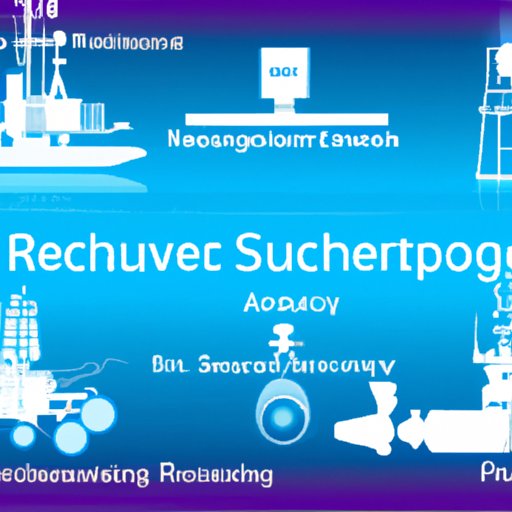Introduction
Technology has made a tremendous impact on the study of the oceans. It has opened up new avenues for research and enabled scientists to explore and understand the oceans in ways never before possible. From remotely operated vehicles (ROVs) and autonomous underwater vehicles (AUVs), to satellite imaging and big data, technology has revolutionized oceanography and allowed researchers to gain unprecedented insights into the behavior of ocean ecosystems. In this article, we will explore how technology is transforming the study of the oceans.

Exploring the Role of Technology in Deep Sea Research
The deep sea is one of the most mysterious and least understood environments on Earth. Until recently, it was virtually impossible for researchers to explore the depths of the ocean due to the extreme pressures and darkness. However, advances in technology have now made it possible for scientists to venture into the deep sea and conduct detailed studies of marine life.
One of the most common tools used by researchers to explore the deep sea is the remotely operated vehicle (ROV). An ROV is an unmanned submersible that is controlled remotely from the surface. It is equipped with cameras, lights, sensors, and other instruments that allow researchers to observe and collect data from the deep sea.
Another tool that is increasingly being used by researchers is the autonomous underwater vehicle (AUV). An AUV is similar to an ROV, but it is capable of navigating and operating independently of any surface control. This allows researchers to conduct long-term studies of the deep sea without having to be physically present.
Both ROVs and AUVs have revolutionized deep sea research, allowing researchers to explore and study the deep sea in ways that were previously impossible.

Examining the Impact of Autonomous Underwater Vehicles on Oceanography
Autonomous underwater vehicles (AUVs) are playing an increasingly important role in oceanography. An AUV is an unmanned underwater vehicle that is capable of navigating and operating independently of any surface control. It is equipped with sensors, cameras, and other instruments that allow it to collect data about the ocean environment.
AUVs have numerous advantages over traditional methods of oceanographic research. They are able to move quickly and cover large areas, making them ideal for surveying and mapping the ocean floor. They also have the ability to dive to much deeper depths than manned vessels, allowing researchers to explore and study the deep sea in ways that were previously impossible. Finally, they are less expensive and require fewer personnel than manned vessels, making them an attractive option for researchers on a budget.
Investigating the Use of Satellite Imaging in Marine Science
Satellite imaging is another technology that has revolutionized marine science. A satellite image is a digital image that is captured by a satellite orbiting Earth. These images can provide valuable information about the ocean environment, such as water temperature, currents, and wave heights.
Satellite images can be used to monitor and study ocean phenomena such as El Niño, coral bleaching, and oil spills. They can also be used to track and identify marine species, map the seafloor, and study ocean circulation patterns. In addition, they are an invaluable tool for coastal management and maritime safety.

Analyzing the Benefits of Remote Sensing for Oceanography
Remote sensing is a technology that is used to collect data about the Earth’s surface from a distance. It is often used in oceanography to collect data about the ocean environment, such as water temperature, currents, and wave heights.
Remote sensing has numerous advantages for oceanographers. It allows researchers to collect data from far away locations without having to be physically present. It also provides a comprehensive view of the ocean environment, which can be used to monitor and study ocean phenomena such as El Niño, coral bleaching, and oil spills. Finally, it is much less expensive and requires fewer personnel than traditional methods of oceanographic research.
Examining How Big Data is Revolutionizing the Study of Oceans
Big data is another technology that is revolutionizing the study of oceans. Big data refers to extremely large datasets that are collected from multiple sources and analyzed using advanced algorithms. It is being used by oceanographers to gain insights into ocean ecosystems, climate change, and the impacts of human activity.
Big data has numerous advantages for oceanographers. It allows researchers to collect and analyze vast amounts of data in a short amount of time. It also allows researchers to detect subtle changes in ocean conditions over time, which can help them better understand the behavior of ocean ecosystems. Finally, it can be used to develop predictive models that can help researchers anticipate future events and trends in the oceans.
Conclusion
Technology has revolutionized the study of the oceans, allowing researchers to explore deeper depths, analyze data more accurately, and gain insights into the behavior of ocean ecosystems. From remotely operated vehicles (ROVs) and autonomous underwater vehicles (AUVs), to satellite imaging and big data, technology is transforming the way we study the oceans. As technology continues to evolve, it will open up new possibilities for oceanographers and allow us to gain even greater insights into the mysteries of the seas.
(Note: Is this article not meeting your expectations? Do you have knowledge or insights to share? Unlock new opportunities and expand your reach by joining our authors team. Click Registration to join us and share your expertise with our readers.)
